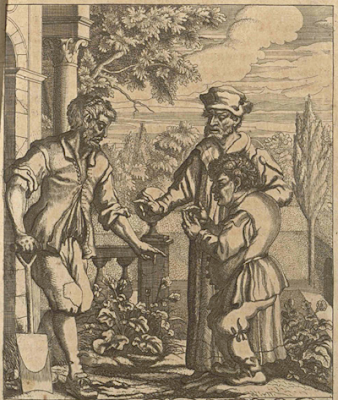SOURCE: The following Latin translations of Syntipas's Greek fables are by Christian Frederick Matthaei and were published in 1781; the book is available at GoogleBooks. This is fable 32 in Syntipas. For other versions, see Perry 119.
READ OUT LOUD. Choose which marked text you prefer to practice with - macrons or accent marks - and read the text out loud until you feel comfortable and confident. Then, try reading the unmarked text at the bottom. It should be easy for you after practicing with the marked texts. :-)
MACRONS. Here is the text with macrons:
Olitōrem quīdam cum vidēret irrigāre olera, rogāvit quōmodo accideret ut grāmina silvestria nec plantāta, nec culta mātūrescerent; quae vērō hominēs sēvissent, saepius ārescerent. "Silvestrēs," rēspondet olitor, "plantae sōla deī prōvidentia cūrantur; mansuētae autem hominum manibus coluntur."
ACCENT MARKS. Here is the text with ecclesiastical accents, plus some color-coding for the words of three or more syllables (blue: penultimate stress; red: antepenultimate stress):
Olitórem quidam cum vidéret irrigáre ólera, rogávit quómodo accíderet ut grámina silvéstria nec plantáta, nec culta maturéscerent; quae vero hómines sevíssent, saépius aréscerent. "Silvéstres," respóndet ólitor, "plantae sola dei providéntia curántur; mansuétae autem hóminum mánibus colúntur."
UNMARKED TEXT. Here is the unmarked text - after practicing with the marked text that you prefer, you should not have any trouble with the unmarked text:
Olitorem quidam
cum videret
irrigare olera,
rogavit
quomodo accideret
ut gramina silvestria
nec plantata,
nec culta
maturescerent;
quae vero
homines sevissent,
saepius arescerent.
"Silvestres," respondet olitor,
"plantae
sola dei providentia curantur;
mansuetae autem
hominum manibus coluntur."
IMAGE. Here is an illustration for the story (image source); this anecdote about the interview with the gardener is sometimes told about Aesop himself, and here is an illustration to the fable featuring Aesop:
skip to main |
skip to sidebar
Stress-free Stress. Latin fables for reading out loud.
Subscribe
Blog Archive
-
▼
2010
(797)
-
▼
May
(216)
- Asinus Ludens (DeFuria)
- Prometheus et Homines (DeFuria)
- Hyaena et Vulpes (DeFuria)
- Aves et Noctua (DeFuria)
- Camelus, Elephas et Simia (DeFuria)
- Agricola et Asini (DeFuria)
- Galerita (DeFuria)
- Agricola et Aquila (DeFuria)
- Hercules et Minerva (DeFuria)
- Leo, Lupus et Umbra Eius (DeFuria)
- Asinus et Canis (DeFuria)
- Serpens et Membra Eius (DeFuria)
- Viatores et Corvus (DeFuria)
- Asinus et Emptor (DeFuria)
- Naufragus et Minerva (DeFuria)
- Leo et Delphinus (DeFuria)
- Lupus et Equus (DeFuria)
- Homo et Leo Aureus (DeFuria)
- Canis venaticus et Vulpes (DeFuria)
- Cycnus Emptus (DeFuria)
- Monedula et Corvi (DeFuria)
- Monedula et Vulpes (DeFuria)
- Scarabaei Duo (DeFuria)
- Medicus imperitus (DeFuria)
- Iuppiter et Apollo (DeFuria)
- Vipera et Hydrus (DeFuria)
- Vipera et Vulpes (DeFuria)
- Mercurius et Terra (DeFuria)
- Rusticus et Planta (DeFuria)
- Vulpes ad Maeandrum fluvium (DeFuria)
- Asinus et Capra (DeFuria)
- Aegrotus et Bonorum Copia (DeFuria)
- Citharoedus (DeFuria)
- Mercurius et Tiresias (DeFuria)
- Iuppiter et Pudor (DeFuria)
- Cornix et Canis (DeFuria)
- Mulier et Vir ebrius (DeFuria)
- Vespa et Serpēns (DeFuria)
- Dives, Filia et Praeficae (DeFuria)
- Asinus et Agaso (DeFuria)
- Simulacrum Mercurii Vendibile (DeFuria)
- Lupus, Lex eius et Asinus (DeFuria)
- Latro et Morus (DeFuria)
- Caprarius et Caprae (DeFuria)
- Mercurius et Artifices (DeFuria)
- Cornix et Corvus (DeFuria)
- Maritus et Uxor (DeFuria)
- Mercurius et Statuarius (DeFuria)
- Medicus et Aegrotus (DeFuria)
- Asinus et Mula (DeFuria)
- Viatores et Platanus (DeFuria)
- Caecus et Lupi Catulus (DeFuria)
- Pater et Filiae (DeFuria)
- Leo in Stabulo (DeFuria)
- Formica et Scarabaeus (DeFuria)
- Heros (DeFuria)
- Simia et Camelus (DeFuria)
- Diogenes iter faciēns (DeFuria)
- Demades: Ceres, Hirundo et Anguilla (DeFuria)
- Homicida (DeFuria)
- Piscatores: Gaudium et Tristitia (DeFuria)
- Venator et Piscator (Babrius-prose)
- Momus et Iupiter (Babrius-prose)
- Equus et Mola (Babrius-prose)
- Lupus, Vulpes et Tria Vera (Babrius-prose)
- Opilio et Canis (Babrius-prose)
- Lupus et Vulpes (Babrius-prose)
- Bubulcus et Taurus Amissus (Babrius-prose)
- Boves et Coquus (Babrius-prose)
- Gallus et Feles (Babrius-prose)
- Canis et Lepus (Babrius-prose)
- Atheniensis et Thebanus (Babrius-prose)
- Equus et Homo (Babrius-prose)
- Ursus et Vulpes (Babrius-prose)
- Lepus et Canis (Babrius-prose)
- Gallina et Feles (Babrius-prose)
- Milvi et Cycni (Aphthonius)
- Lucerna Superba (Babrius-prose)
- Homo et Mercurius et Formicae (Babrius-prose)
- Vulpes et Leo, Venantes (Aphthonius)
- Auceps et Cicada (Aphthonius)
- Rusticus, Draco et Aquila (Aphthonius)
- Sus, Capra, et Ovis (Aphthonius)
- Aquila et Sagitta (Aphthonius)
- Cycnus et Corvus (Aphthonius)
- Homo quidam et olitor (Syntipas)
- Vulpes et simia (Syntipas)
- Lupus et Leo (Babrius-prose)
- Leo et Aquila (Babrius-prose)
- Vulpes et leo (Syntipas)
- Eques et Equus (Babrius-prose)
- Lepus et vulpes (Syntipas)
- Homo et Vulpes (Babrius-prose)
- Canis et lupa (Syntipas)
- Puer et vir (Syntipas)
- Avis et hirundo (Syntipas)
- Bos et Asinus (Babrius-prose)
- Agricola et Grues (Babrius-prose)
- Canes et vulpes (Syntipas)
- Homo et cyclops (Syntipas)
-
▼
May
(216)
Bestiaria Latina Blog
Animalia
Bestiaria Proverbs
Random Aesop Widget
NoDictionaries.com
Need help reading Latin? Try Lee Butterman's NoDictionaries.com website. Cut and paste your Latin text into the box provided, and it will generate a word list. Find out more.
About Me
Here are the books I have written: Aesop's Fables, Aesop's Fables in Latin, Mille Fabulae et Una, Latin Via Proverbs, Vulgate Verses, and Roman Sudoku.






